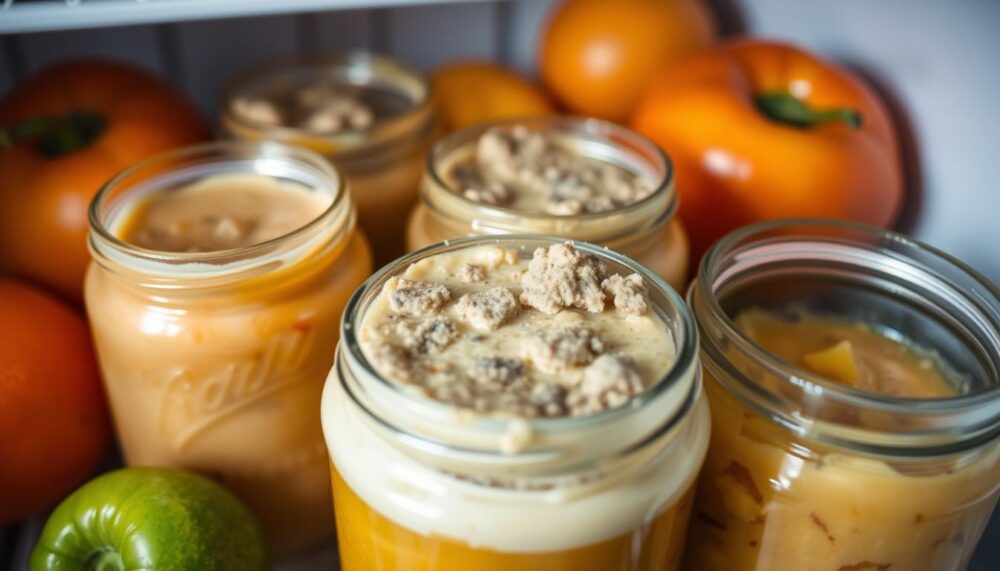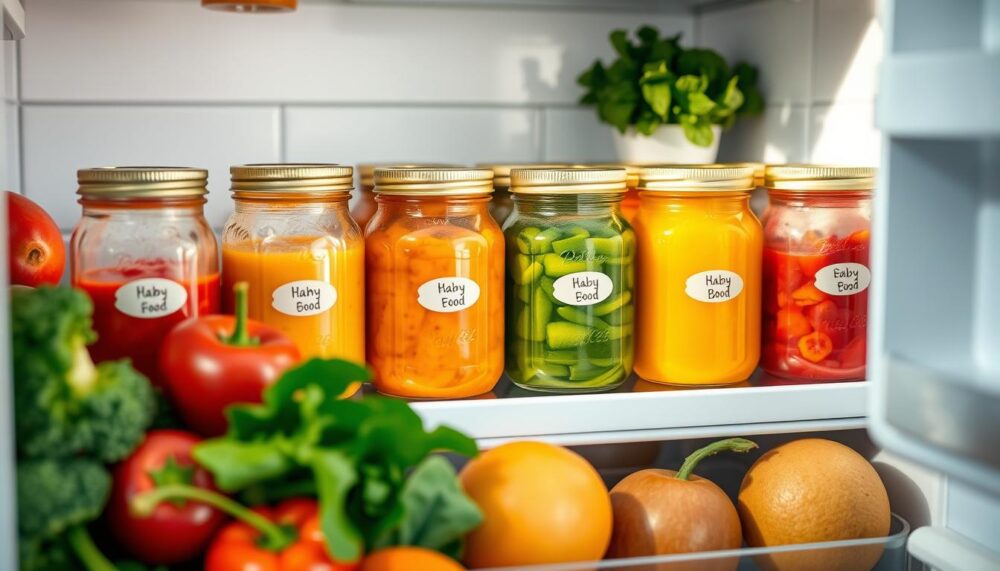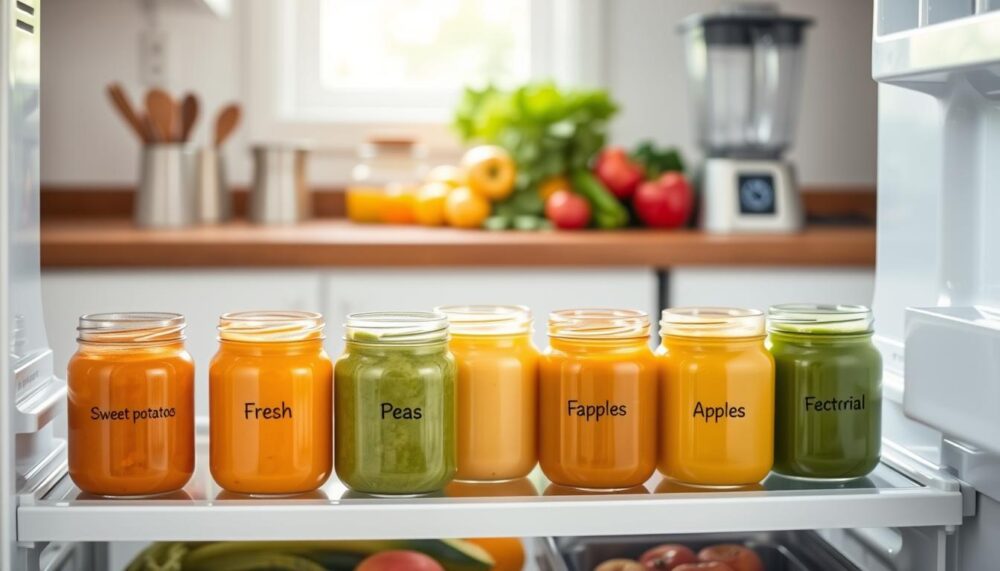
How long does homemade baby food last in the fridge? 🍼 This is a common question for parents making fresh meals for their little ones. Typically, homemade baby food can stay safe in the fridge for up to 3 days — but there are a few important storage tips you need to know to keep your baby’s food fresh and healthy.
As parents, we want the best for our babies. That means fresh, healthy meals. Knowing how long homemade baby food lasts in the fridge is key. We’ll look at what affects its shelf life, how long it should stay good, and how to spot when it’s gone bad.
Key Takeaways
- Homemade baby food lasts 3-5 days in the fridge.
- Using airtight containers and keeping the fridge cool helps keep it fresh.
- Look for signs like color changes, mold, or bad smells to know if it’s spoiled.
- Freezing can make homemade baby food last longer, up to several months.
- It’s important to handle and prepare baby food safely to avoid harmful bacteria.
Understanding Homemade Baby Food Shelf Life
Several factors affect how long homemade baby food lasts. The shelf life of homemade baby food changes based on ingredients, how it’s made, and where it’s stored.
Factors Affecting Baby Food Freshness
Several things influence the freshness of baby food:
- Acidity levels: Foods with more acidity, like fruits, last longer.
- Presence of preservatives: Homemade food without preservatives might not last as long.
- Preparation techniques: Keeping food clean and handled right helps keep it safe and fresh.
Importance of Proper Storage
Keeping baby food fresh is key for your baby’s health. The right storage, like keeping it cool and sealed, is crucial. It helps keep nutrients in and bacteria out.
| Storage Condition | Recommended Shelf Life |
|---|---|
| Refrigerator (40°F or below) | 3-5 days |
| Freezer (0°F or below) | 2-3 months |
Knowing what affects how long does homemade baby food last in the fridge and the need for good storage helps. This way, your homemade meals stay fresh, healthy, and safe for your baby.

Recommended Fridge Storage Times for Baby Purees
It’s important to know how long homemade baby food lasts in the fridge. This ensures your baby’s food is safe and fresh. Generally, homemade baby food can be stored in the fridge for 3-5 days. This depends on the type of food.
Here’s a quick guide to help you understand how long different baby foods last in the fridge:
| Food Group | Refrigerator Storage Time |
|---|---|
| Pureed Fruits | 3-5 days |
| Pureed Vegetables | 3-5 days |
| Meat and Fish Purees | 1-3 days |
| Mixed Dishes (e.g., casseroles, stews) | 3-4 days |
These are general guidelines. Always check the specific instructions for your baby food recipe or container. Proper storage and handling are crucial for the safety and freshness of your homemade baby food.

Signs of Spoiled Homemade Baby Food
Storing homemade baby food in the fridge requires watching for spoilage signs. Ignoring these signs can risk your baby’s health. Let’s look at visual cues, changes in smell, and texture that mean the food has spoiled.
Visual Cues for Spoilage
Discoloration, mold, or separation in baby food are clear spoilage signs. A color change, fuzzy growth, or ingredient separation means it’s not safe. If you see these signs, throw away the food right away.
Odor and Texture Changes
Also, check the food’s smell and texture. A sour smell or a slimy, lumpy feel means it’s spoiling. If the food smells bad or feels different, it’s best to throw it away.
Checking for these spoilage signs is key to safe handling of baby food. It helps keep your baby healthy and safe. By being careful and throwing away bad food, you protect your child’s health.

How Long Does Homemade Baby Food Last in the Fridge?
We all want the best for our babies, including fresh, healthy homemade food. But how long does this food stay good in the fridge? Homemade baby food can last 3 to 5 days in the fridge, depending on the type.
To keep baby food fresh, store it right. Divide it into portions and use airtight containers or BPA-free bags. This keeps it fresh and safe. Also, label the containers with the date you made it.
Some foods last longer than others in the fridge. Fruit purees can stay good for 3-5 days. But, veggie purees might only last 2-3 days. Meat and fish purees have the shortest shelf life, lasting 1-2 days.
“Proper storage and handling are key to ensuring the shelf life of homemade baby food is maximized, keeping your little one safe and nourished.”
Knowing how long baby food lasts in the fridge helps. By storing it correctly, you can give your baby the best food. This is a great way to start their life off right.

Extending the Shelf Life of Baby Food
Parents often worry about how long homemade baby food lasts in the fridge. But, there are ways to keep your baby’s meals fresh for longer. This ensures you always have healthy food ready for them.
Freezing Homemade Baby Food
Freezing is a great way to keep homemade baby food fresh. When frozen right, your baby’s meals can last months. This is perfect for families on the go. Here’s how to freeze baby food effectively:
- Use airtight containers or freezer-safe bags. Make sure to leave some space for expansion.
- Label each container with what’s inside and the date. This helps you keep track of freshness.
- Freeze food in single portions. This makes it easy to thaw only what you need.
- Use a deep freeze or chest freezer if you can. They keep a steadier temperature than regular freezers.
Having a freezer full of homemade baby food is convenient. It gives you peace of mind, knowing your baby’s meals are just a thaw away.
| Food Type | Fridge (40°F or below) | Freezer (0°F or below) |
|---|---|---|
| Pureed Fruits and Vegetables | 3-4 days | 6-8 months |
| Meat and Poultry Purees | 1-2 days | 2-3 months |
| Combination Dishes | 3-4 days | 2-3 months |

Learning to freeze homemade baby food is key. It lets you how long does homemade baby food last in the fridge. You can ensure your baby always eats nutritious, home-cooked meals. Plus, you can baby food storage with confidence. Discover the joy of preserving baby food and enjoy the fruits of your labor.
Safe Handling and Preparation Tips
Ensuring the safe handling of baby food is key. Proper preparation and storage are essential. Good hygiene is crucial for preserving baby food and keeping your baby healthy. Here are some important tips:
- Always wash your hands thoroughly with soap and warm water before handling baby food.
- Thoroughly clean all utensils, surfaces, and containers used for preparing and storing homemade baby food.
- Avoid cross-contamination by keeping raw ingredients separate from cooked or pureed baby food.
- Refrigerate prepared baby food promptly, and never leave it at room temperature for more than 2 hours.
- Discard any baby food that has been left out for longer than 2 hours or shows signs of spoilage.
By following these simple safe handling and preparation tips, you can keep your homemade baby food fresh and safe. Your little one will enjoy it.
“Proper food safety practices are essential when it comes to preserving baby food and protecting your child’s health.”
| Recommended Practices | Why It Matters |
|---|---|
| Thoroughly wash hands and clean all surfaces | Prevents the spread of harmful bacteria and cross-contamination |
| Refrigerate prepared baby food promptly | Slows the growth of bacteria and maintains freshness |
| Discard any food that has been left out too long | Ensures the safe handling of baby food and avoids potential illness |
Transitioning to Solid Foods
As your baby grows, introducing solid foods is a big step. It’s a chance to explore new tastes and textures. This helps them grow strong and healthy, with the right infant nutrition.
Introducing New Textures and Flavors
Start with smooth foods when introducing solid foods. Then, move to chunkier foods as they get used to eating. This makes sure they can handle different textures and swallow safely.
- Begin with single-ingredient purees, such as sweet potatoes, carrots, or applesauce.
- Gradually introduce new flavors, one at a time, to help your baby develop a varied taste profile.
- Transition to thicker, lumpier textures as your baby gets older and more comfortable with solid foods.
- Offer a variety of fruits, vegetables, grains, and proteins to ensure your baby gets a well-rounded baby food diet.
Every baby is different when it comes to eating solids. So, be patient and listen to what they like and need.
| Texture | Age |
|---|---|
| Pureed | 4-6 months |
| Mashed | 6-8 months |
| Chunky | 8-12 months |
By slowly introducing solid foods and new tastes, you help your baby develop a healthy taste. This is the start of a lifetime of good infant nutrition.
“The first year of a child’s life is a critical time for developing healthy eating habits and food preferences.”
Nutritional Benefits of Homemade Baby Food
Homemade baby food is a great choice for infant nutrition. We can pick the ingredients and make sure our babies get all the nutrients they need. This ensures a balanced diet full of vitamins, minerals, and more.
Homemade meals taste better and keep more nutrients than store-bought ones. Preparing food at home means our kids get the best nutrition for growing strong and healthy.
One big plus of homemade baby food is controlling what goes into it. We can skip additives and preservatives found in commercial foods. This way, we give our babies clean, healthy food.
Homemade food also lets us mix up flavors and textures. As our babies get older, we can introduce more foods. This helps them develop good eating habits early on.
| Nutrient | Benefits of Homemade Baby Food | Benefits of Store-Bought Baby Food |
|---|---|---|
| Vitamins and Minerals | Freshly prepared meals retain more of these essential nutrients. | Often undergo processing that can reduce vitamin and mineral content. |
| Fiber | Homemade options contain more natural fiber from whole food ingredients. | May have lower fiber content due to processing and ingredient selection. |
| Preservatives and Additives | We can avoid these unwanted ingredients when making it ourselves. | Commonly include preservatives and other additives for shelf stability. |
Choosing homemade infant nutrition means our babies get top-notch, nutrient-rich food. The homemade baby food we make supports their growth and sets them up for a lifetime of healthy eating.
Starting our journey of preserving baby food means embracing the many benefits of homemade options. With a bit of effort, we can feed our little ones the best that nature has to offer.
Conclusion
Feeding your baby is a big responsibility. Knowing how long homemade baby food lasts in the fridge is key. It keeps their meals fresh, healthy, and safe. Freezing can also help keep their food good for longer.
It’s important to know when food has gone bad. Following storage times helps keep your baby’s food safe and good to eat. This helps your baby start eating solid foods well and builds healthy eating habits for life.
Whether you’re new to making baby food or have been doing it for a while, remember a few things. Make sure to know how long homemade baby food lasts in the fridge. Use the best ways to store it. And always handle it safely to give your baby the best nutrition.
FAQ
How long does homemade baby food last in the fridge?
Homemade baby food can last 3-5 days in the fridge. It depends on the type of food. Keeping it fresh and safe is key.
What factors affect the freshness of homemade baby food?
Several things affect homemade baby food’s shelf life. Ingredients, how it’s made, and storage matter a lot. Keeping it cool and away from air helps a lot.
How can I store homemade baby food to extend its shelf life?
Freezing is a great way to keep homemade baby food fresh. It can last months, making it easy for busy families.
What are the signs of spoiled homemade baby food?
Watch for signs of spoilage in homemade baby food. Look for color changes, mold, or separation. Also, bad smells and textures mean it’s gone bad.
How can I ensure safe handling and preparation of homemade baby food?
Keeping homemade baby food safe is very important. Follow good hygiene, use clean tools, and avoid mixing foods to keep it safe for your baby.
What are the nutritional benefits of homemade baby food?
Homemade baby food is full of nutrients because parents choose the ingredients. It’s also fresher, keeping more vitamins and minerals in than store-bought food.